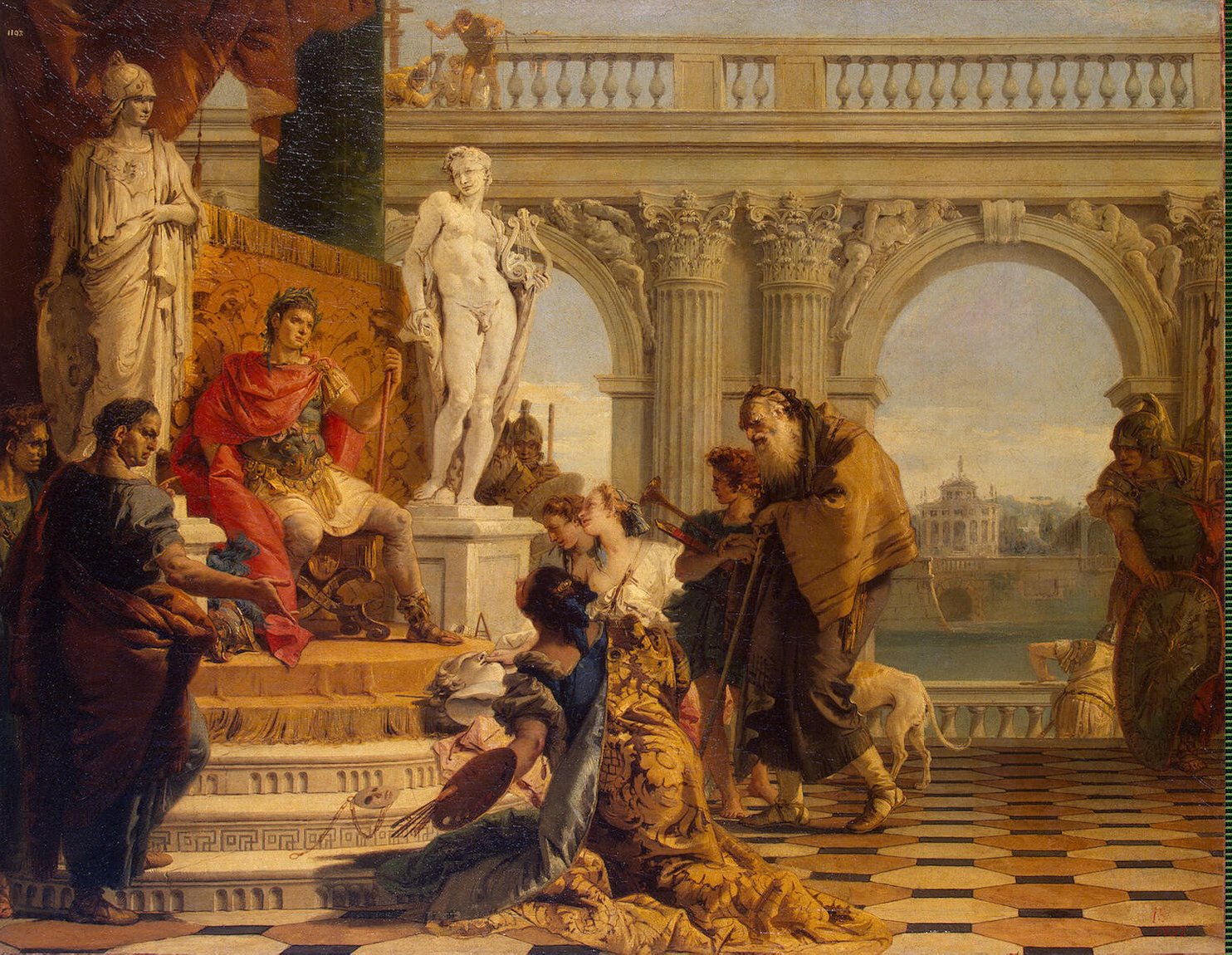Matthias Grünewald
Isenheim Altarpiece ~ 1512-1516
Unterlinden Museum at Colmar
Author: C .T.
Uncle Adolf’s table talk, 24
Night of 9th October 1941
Germany and the Asiatic hordes—
Balance of power—A Pyrrhic victory.
We Germans are alone responsible that the tide of Huns, Avars and Magyars was halted in Central Europe. We were already a great empire when the English were only beginning to build up their maritime power. If we hadn’t been such fools as to tear each other to pieces in order to find out whether we should consume God in the forms of bread and wine, or of bread only, England would never have been able to have her say concerning the balance of power on the Continent.
England is never a danger except when she can oppose a power who threatens her supremacy with other powers whom she induces to play her game. For England, the First World War was a Pyrrhic victory. To maintain their empire, they need a strong continental power at their side. Only Germany can be this power.
Uncle Adolf’s table talk, 25
10th October 1941, midday
Fighting for open spaces—The flow back from West to East—Christianity and natural selection.
War has returned to its primitive form. The war of people against people is giving place to another war—a war for the possession of the great spaces.
Originally war was nothing but a struggle for pasture-grounds. To-day war is nothing but a struggle for the riches of nature. By virtue of an inherent law, these riches belong to him who conquers them. The great migrations set out from the East. With us begins the ebb, from West to East. That’s in accordance with the laws of nature. By means of the struggle, the élites are continually renewed. The law of selection justifies this incessant struggle, by allowing the survival of the fittest.
Christianity is a rebellion against natural law, a protest against nature. Taken to its logical extreme, Christianity would mean the systematic cultivation of the human failure.
Uncle Adolf’s table talk, 26
Political power
Uncle Adolf’s table talk, 27
13th October 1941
I’ve been wondering lately whether it wouldn’t be best to collect the men responsible for the control of the economics of the following countries: Denmark, Norway, Holland, Belgium, Sweden and Finland.
We’d give them a notion of the vistas that present themselves nowadays. The majority of them are not at all aware of the immense field that opens up before us.
On beauty
“Perceptions about human beauty fall within the realm of psychology and sociology.”
They do not. This assertion is simply false.
Beauty is measurable, most particularly as regards symmetry and how closely the ratios between certain facial or bodily features approach certain values.
It’s mathematically quantifiable.
There has been plenty of research on this. Denying its existence serves no purpose.
Uncle Adolf’s table talk, 28
On Ann Coulter
 At 53 years old, Ann Coulter, a Christian fanatic who once said at a public lecture “I don’t care about anything else; Christ died for my sins, and nothing else matters”, and who, in one of her books, once characterized evolution as bogus science, seems an unlikely pinup girl for any advocate of white interests.
At 53 years old, Ann Coulter, a Christian fanatic who once said at a public lecture “I don’t care about anything else; Christ died for my sins, and nothing else matters”, and who, in one of her books, once characterized evolution as bogus science, seems an unlikely pinup girl for any advocate of white interests.
She’s a never-married career girl who’s “dated” non-whites, including at least one Jew. No white children ever issued from her shriveled womb, nor, at this point, will they.
White people are abolishing themselves, and Ann Coulter is a case study in how and why.
Uncle Adolf’s table talk, 29
14th October 1941, midday
SPECIAL GUEST: REICHSFUEHRER HIMMLER
The Churches—Difficulty of compromising with a lie—No truck with religion for the Party—Antagonism of dogma and science— Let Christianity die slowly—The metaphysical needs of the soul—No State religion—Freedom of belief.
Being weighed down by a superstitious past, men are afraid of things that can’t, or can’t yet, be explained—that is to say, of the unknown. If anyone has needs of a metaphysical nature, I can’t satisfy them with the Party’s programme. Time will go by until the moment when science can answer all the questions.
So it’s not opportune to hurl ourselves now into a struggle with the Churches. The best thing is to let Christianity die a natural death. A slow death has something comforting about it. The dogma of Christianity gets worn away before the advances of science. Religion will have to make more and more concessions. Gradually the myths crumble. Christianity, of course, has reached the peak of absurdity in this respect. And that’s why one day its structure will collapse.
But one must continue to pay attention to another aspect of the problem. It’s possible to satisfy the needs of the inner life by an intimate communion with nature, or by knowledge of the past. Only a minority, however, at the present stage of the mind’s development, can feel the respect inspired by the unknown, and thus satisfy the metaphysical needs of the soul.
The average human being has the same needs, but can satisfy them only by elementary means. That’s particularly true of women, as also of peasants who impotently watch the destruction of their crops. The person whose life tends to simplification is thirsty for belief, and he dimly clings to it with all his strength.
Nobody has the right to deprive simple people of their childish certainties until they’ve acquired others that are more reasonable. Indeed, it’s most important that the higher belief should be well established in them before the lower belief has been removed. We must finally achieve this.
 It seems to me that nothing would be more foolish than to re-establish the worship of Wotan. Our old mythology had ceased to be viable when Christianity implanted itself. Nothing dies unless it is moribund. At that period the ancient world was divided between the systems of philosophy and the worship of idols. It’s not desirable that the whole of humanity should be stultified—and the only way of getting rid of Christianity is to allow it to die little by little.
It seems to me that nothing would be more foolish than to re-establish the worship of Wotan. Our old mythology had ceased to be viable when Christianity implanted itself. Nothing dies unless it is moribund. At that period the ancient world was divided between the systems of philosophy and the worship of idols. It’s not desirable that the whole of humanity should be stultified—and the only way of getting rid of Christianity is to allow it to die little by little.
A movement like ours mustn’t let itself be drawn into meta-physical digressions. It must stick to the spirit of exact science. It’s not the Party’s function to be a counterfeit for religion.
If, in the course of a thousand or two thousand years, science arrives at the necessity of renewing its points of view, that will not mean that science is a liar. Science cannot lie, for it’s always striving, according to the momentary state of knowledge, to deduce what is true. When it makes a mistake, it does so in good faith. It’s Christianity that’s the liar. It’s in perpetual conflict with itself.
One may ask whether the disappearance of Christianity would entail the disappearance of belief in God. That’s not to be desired. The notion of divinity gives most men the opportunity to concretise the feeling they have of supernatural realities. Why should we destroy this wonderful power they have of incarnating the feeling for the divine that is within them?
The man who lives in communion with nature necessarily finds himself in opposition to the Churches. And that’s why they’re heading for ruin—for science is bound to win. I especially wouldn’t want our movement to acquire a religious character and institute a form of worship. It would be appalling for me, and I would wish I’d never lived, if I were to end up in the skin of a Buddha!
I envisage the future, therefore, as follows: First of all, to each man his private creed. Superstition shall not lose its rights. The Party is sheltered from the danger of competing with the religions. These latter must simply be forbidden from interfering in future with temporal matters. From the tenderest age, education will be imparted in such a way that each child will know all that is important to the maintenance of the State. As for the men close to me, who, like me, have escaped from the clutches of dogma, I’ve no reason to fear that the Church will get its hooks on them.
We’ll see to it that the Churches cannot spread abroad teachings in conflict with the interests of the State. We shall continue to preach the doctrine of National Socialism, and the young will no longer be taught anything but the truth.



